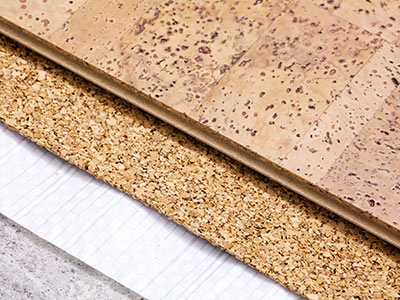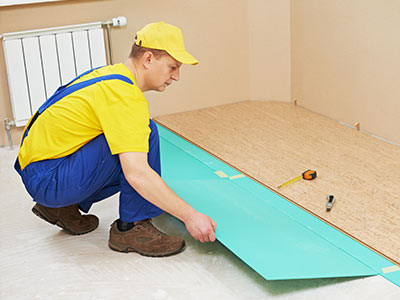Back to Flooring Products
Sound Insulation for Hardwood Floors
 One thing is for sure, real wood floors are not just beauty and look. Despite the fact that hardwood flooring brings a lot of charm, character, style, and elegance to your home, we all know that we are opting for a hardwood floor being installed in our homes mainly because the durability, functionality, and comfort this type of flooring offers and provides. In addition, real wood flooring can be further improved by professionals in order to ensure even more convenience and benefits. One of the most common and popular amongst homeowners ways to ensure more comfort with your newly installed hardwood floor is by opting for additional insulation.
One thing is for sure, real wood floors are not just beauty and look. Despite the fact that hardwood flooring brings a lot of charm, character, style, and elegance to your home, we all know that we are opting for a hardwood floor being installed in our homes mainly because the durability, functionality, and comfort this type of flooring offers and provides. In addition, real wood flooring can be further improved by professionals in order to ensure even more convenience and benefits. One of the most common and popular amongst homeowners ways to ensure more comfort with your newly installed hardwood floor is by opting for additional insulation.
Insulating a wooden floor can have so many advantages and benefits. Insulation works for creating a barrier between the subfloor and the floorboards in order to protect the floor from a plethora of possible issues in the future. Besides a moisture barrier, additional insulation is also great for improving the stability of your floor. It helps you keep your feet warm during the winter months and your heating bills lower since insulation prevents the heated air from inside the room to leave through cracks and gaps in the floor. And, of course, wood floor insulation is often preferred because it comes with soundproofing properties and decreases the noise solution significantly.
In this article we would like to discuss the importance and benefits of impact sound insulation for hardwood floors, so stay tuned to learn more.
Why Soundproofing Your Hardwood Floor Is Important?
Now, as the name of this type of insulation suggests, the main purpose of soundproofing insulation is to decrease noise pollution, which is a great option for apartment buildings, for hardwood floors installed upstairs in your home and could be even a requirement for some buildings. Depending on the type of real wood flooring and the installation method used, some real wood floors tend to be a bit noisier and create noise pollution due to heavy footfall. Therefore, footfall sound insulation is always a great idea and a beneficial feature for hardwood floors that ensures more comfort.
Make sure you make a difference between walking sound and footfall impact sound. While the walking sound is the one you hear in the room where the floor is installed and when someone is walking on the surface, which is something absolutely normal and definitely not annoying or impacting your comfort, impact sound is the one transferred to the surrounding premises, which creates sound pollution. The impact sound could be caused by a number of things, including footsteps, moving or dragging furniture pieces, the vibrations coming from household machinery such as a washing machine, etc.
Without proper soundproofing insulation for your hardwood floor, even the lowest sound will be transferred to all the adjacent rooms and areas of the respective room. Therefore, the minimum requirement for hardwood floor sound impact insulation is not necessarily for almost all apartment buildings and all premises where you will have neighbours above and below you. However, even if you are living in your own house and you have no neighbours to consider, soundproofing insulation will still come with a lot of benefits and ensures overall comfort and convenience.
There are regulations designed to restrict sound transmission in order to protect people from surrounding living and working spaces and you should often comply with such regulations and ensure efficient sound insulation of your wooden floor. Footfall impact sound insulation is definitely something very useful in all rooms of all sorts of buildings and premises. Especially when it comes to real wood flooring installed in a floating way, which means that every single step and vibration could easily be transformed into impact sound, good soundproofing insulation for your floor will definitely save you a lot of discomfort. However, even when it comes to glued down or nailed down type of installation of your hardwood floor, you can still benefit a lot from impact sound insulation.
Impact Sound Insulation – More Benefits

Besides ensuring great soundproofing properties, impact sound insulation can be beneficial in other ways too. Now, insulation comes made out of different materials. However, some types of insulation are great for ensuring more stability and durability for wooden floors installed over uneven subfloors that cannot be levelled perfectly for some reason.
Of course, one of the favourite benefits of having hardwood floor insulation installed for many homeowners is the thermal benefits properties. Who does not want warm feet during the winter months while the heating bills do not cost you a little fortune? However, keep in mind that sound impact insulation cannot replace thermal insulation and you may also want to consider the latter for your installation project.
Impact Sound Insulation – What Materials Are Used
There are a few main types of soundproofing insulation available on the market. Different types of insulation are made out of different materials and each one of them has its pros and cons. Make sure to learn more about the different properties and advantages of different types of sound impact insulation in order to make the best choice for your project. Here are the most common materials used for the manufacture of soundproofing insulation for hardwood floors.
Plastic
Plastic impact sound insulation is actually made out of PE foam. The insulation is available in the form of sheets and firms and comes in different thicknesses and different finishes. This type of insulation can be used under all types of flooring. What determines whether the insulation will be more efficient at soundproofing is the thickness. When it comes to very noisy hardwood floors, we recommend you to use the thicker PE insulation available on the market as it will insulate all sounds the best. However, if there is not a serious issue with a noisy floor, you can always opt for a thin aluminium film with a PE layer glued to it.
Cork
Cork is yet another material used for soundproofing insulation for hardwood floors. This natural material does not only come with soundproofing properties but also ensures thermal insulation. This type of insulation is available in panels or rolls. It is easy to cut in the desired shape and dimensions.
Wood fibre
Wood fibre insulation is made out of debarked and crushed into wood fibres residual wood. This type of insulation also comes with great soundproofing properties. The insulation comes in panels with a size that makes installation fast and easy. Besides its soundproofing insulation properties, wood fibre also ensures thermal insulation and works as a moisture barrier between the floor and the subfloor.
Hemp felt
Hemp felt is available in different widths and lengths in the form of rolls. Hemp felt is yet another product with not only soundproofing but also thermal insulation properties. It is also a great product for fixing the unevenness of subfloors that cannot be perfectly levelled.
Other materials
Other materials used for soundproofing insulation of hardwood floors include Styrofoam, ripple board, coconut fibre, and expanded clay spill.
Best Soundproofing Insulation for Hardwood Flooring
You may be wondering what type of soundproofing insulation to choose for your project. In general, there is not that much of a dramatic difference between the different types of impact sound insulation made from different materials. The general rule is that the noisier the floor is, the thicker the sound impact insulation layer you would need to reduce the noise pollution as much as possible. Therefore, if your floor is older and worn, it is not that stable, or it is installed floating, it will probably be on the noisier side and you will need a thicker insulation layer.
Constructive Requirements
When it comes to the design requirements for sound impact insulation for hardwood flooring, there are three factors that should be taken into account.
Moisture barrier
In case your hardwood floor is installed on a mineral substrate such as screed, the additional moisture protection of the soundproofing insulation plays a very important role. Blocking moisture from the substrate is important and you need to use a steam barrier or steam brake if necessary. Now, keep in mind that modern products offered as soundproofing insulation already come equipped with an integrated moisture film that protects both the layer of insulation and the wooden floorboards from moisture. However, keep in mind that you don’t want to install soundproofing insulation with an additional moisture film on top of the wood subfloor, otherwise, this will trap the moisture under the insulation layer and most probably affect and damage the subfloor itself.
Compensation of unevenness
The PC value is what defines the balancing capacity of every soundproofing insulation or how high spot bumps in the underbody or the subfloor can be. Since the norm height of spot unevenness is around one mm, a PC value of half mm is sufficient for the soundproofing insulation for wood flooring. Higher than 3mm unevenness the subfloor should be levelled in advance and before having the soundproofing insulation layer installed.
Thermal insulation value
The thermal insulation value is most important if the hardwood floor is installed on top of the underfloor heating system. In cases of underfloor heating, the soundproofing insulation material should have very low thermal insulation properties. When it comes to unheated floors, you can definitely choose a sound impact insulation working as thermal insulation too.